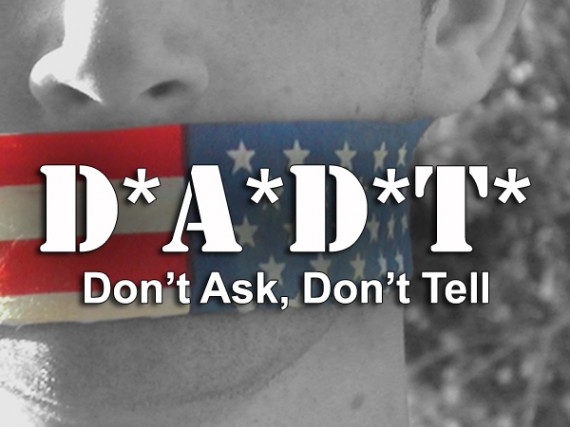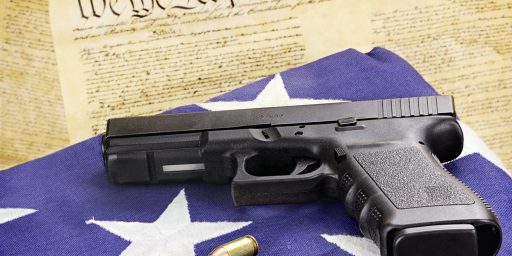DADT Ruled Unconstitutional
A federal court has found that don't ask, don't tell violates the First and Fifth Amendments.
 Via the NYT: Judge Rules That Military Policy Violates Rights of Gays
Via the NYT: Judge Rules That Military Policy Violates Rights of Gays
The plaintiffs challenged the law under the Fifth and First Amendments to the Constitution, and Judge Phillips agreed.
“The don’t ask, don’t tell act infringes the fundamental rights of United States service members in many ways,” she wrote. “In order to justify the encroachment on these rights, defendants faced the burden at trial of showing the don’t ask, don’t tell act was necessary to significantly further the government’s important interests in military readiness and unit cohesion. Defendants failed to meet that burden.”
The rule, she wrote in an 86-page opinion, has a “direct and deleterious effect” on the armed services.
The plaintiffs argued that the act violated the rights of service members in two ways.
First, they said, it violates their guarantee of substantive due process under the Fifth Amendment. The second restriction, the plaintiffs said, involves the free-speech rights guaranteed under the First Amendment. Although those rights are diminished in the military, the judge wrote, the restrictions in the act still fail the constitutional test of being “reasonably necessary” to protect “a substantial government interest.”
The “sweeping reach” of the speech restrictions under the act, she said, “is far broader than is reasonably necessary to protect the substantial government interest at stake here.”
Given that the policy was already on its way out the door, this ruling is far less dramatic than it otherwise would have been. At a minimum, along with the recent ruling on California’s gay marriage ban (and arguably going back to Lawrence v. Texas), it would appear that we are hitting an historical stage in which the courts are going to more actively assert that American citizens who are homosexual deserve to be treated the same under the law as their heterosexual compatriots.






And that’s the way it should be.
It is another example of another activist judge overstepping her boundary. If a President wants to overturn it, it is within his right but a judge creating legislation out of personal feeling is wrong.
One aspect of the ruling that many probably didn’t consider, if it is upheld, recruiters and commanders would be able to question a person’s suspected sexuality and sexual actions that violate policies. Doing away with the DADT does not change other regulations prohibiting homosexual activity. Therefore more homosexual may in up getting boot out of the military than before.
Wayne raises a good point. If DADT is unconstitutional, don’t we just return to the pre-DADT law that was worse for homosexuals?
I continue to be depressed to observe political compromises being rejected by the courts, when I think compromise is usually the best solution. Here, the Court pointed out that the Obama administration has said that DADT doesn’t work, as he was trying to build political support to revise DADT. The court turns around and quotes Obama as if his opinion is the last word.
And Pavlov’s dog barks for another treat.
Seriously, though, guys, if DADT is scrapped due to its discriminatory nature, then it’s a bit unlikely that an even more discriminatory policy will be implemented in its place. That’s not usually how it works.
Besides, you’ve got to understand that being gay and engaging in “homosexual activity” are two different things. Gay people can and do go through long periods, such as a military deployment, without any sexual activity at all…you know, just like straight people. Prohibit homosexual activity. Prohibit all sexual activity. I don’t care.
Just don’t say you can’t serve because you’re gay.
> I think compromise is usually the best solution.
Are you willing to compromise equal justice under the law for yourself? For your family? Or is that just something gays should have to do?
Herb
Part of her decision relied on the “Freedom of speech” part of the constitution. That argument won’t apply to many of the other regulations. Therefore her weak argument that relies on the first and fifth amendments will have to rely solely on the Fifth Amendment.
SCOTUS has already ruled the military is a special case and constitutional rights are not apply to their members in the same way as the general public. For example freedom of speech is limited in many ways including not disclosing classified materials, speaking ill of the President and members of Congress, and others. It also has established that they are tried in a different system. They are tried in military court for violations of the UCMJ which are regulations that fall outside the laws of a typical citizen.
If her decisions stand, I will be very surprise unless Obama administration decides not to fight it. However if they decide not to fight it, he will have corrupted the system further, he will pay a political price and people’s confidence in our system will go down much further.
Establishing it is OK to corrupt our system and do misdeeds for the sake of getting what you want is a very bad precedent.
There is a military need for these abridgments of speech. As the judge says:
The defendants failed to prove there was a military need for Don’t Ask, Don’t Tell, so the “encroachment on these [1st amendment] rights” was not justified.
Besides, I think you’re coming at this the wrong way. Instead of coming up with reasons why we can’t get rid of DADT, we need to come up with reasons why we need it. If there’s no need, the policy is superfluous and should be rescinded.
angin-san, my rights are always being compromised. Should I list the ways?
But as I understand it, the court rejected the idea that gays were being denied equal protection under the law. It’s not an equal justice case, that count was dismissed last year.
It’s about privacy, building about the SCOTUS decision overruling sodomy laws, which was premised on the notion that in a free society, it’s citizens have some basic right to be left alone.
I think it’s a very odd concept to apply to the military, where there is no right to serve and certainly no right to personal freedom. You can’t even sue the government for racial discrimination in the military the last I knew.
> my rights are always being compromised. Should I list the ways?
Yes. I am curious if they equate to being forced to live a lie for the privilege of serving your country and being prepared to fight and die for freedom. And I wonder if anyone is telling you that you cannot marry the person you choose.